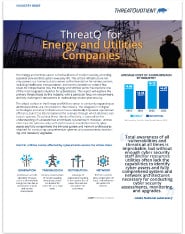THREATQ FOR:
Key Energy Industry Challenges
RANSOMWARE
Ransomware, a malicious software that encrypts a victim’s data and demands a ransom in exchange for a decryption key, stands out as one of the most significant threats to the Energy sector. Ransomware attacks not only disrupt operations but also create a sense of helplessness in victims, compelling them to consider paying a ransom to the attacker in exchange for the decryption key and a chance to restore their critical systems.
SUPPLY CHAIN ATTACKS
The Utilities industry is susceptible to supply chain attacks, which target the software and hardware components that form the backbone of its operations. Attackers may compromise these supply chains to introduce vulnerabilities into the infrastructure, potentially affecting numerous utilities at once.
INCOMPLETE INTEGRATION OF SYSTEMS
The sector’s rapid adoption of digital technologies has often led to incomplete integration of systems. This fragmented architecture can create security gaps and weaknesses that attackers can exploit, as the sector’s interconnected systems rely heavily on data flow and communication and can create security gaps and weaknesses that attackers can exploit.
IDENTIFY AND ACCESS MANAGEMENT (IAM) INEFFICIENCIES
IAM systems are critical for ensuring that only authorized personnel access sensitive systems. Inefficiencies, misconfigurations, or weak authentication mechanisms in IAM can expose the sector to unauthorized access, data breaches, and other malicious activities.
MOBILE DEVICE PHISHING
The proliferation of mobile devices in the sector’s operations introduces another vector for attack. Phishing attacks targeting mobile devices can compromise sensitive information and access to critical systems, further challenging the sector’s cybersecurity posture.
THREATQUOTIENT IS A PROUD AFFILIATE OF E-ISAC

THREATQUOTIENT IS PROUD TO HAVE AS A CUSTOMER

ThreatQ Secures the Energy Industry
CONSOLIDATE
all sources of external (e.g., E-ISAC, OSINT) and internal (e.g., SIEM) threat intelligence and vulnerability data in a central repository.
ELIMINATE
noise and easily navigate through vast amounts of threat data to focus on critical assets and vulnerabilities.
PRIORITIZE
what matters most for your environment.
PROACTIVELY HUNT
for malicious activity which may signal malicious activity, denial of service attacks and other disruptions and potential harm to customers, employees and constituents.
FOCUS
on known security vulnerabilities in currently active exploits which may impact regulatory status and security posture.
ACCELERATE ANALYSIS
and response to attacks through collaborative threat analysis that enables shared understanding and coordinated response.
AUTOMATE
threat detection, investigation and response.
Voice of the Customer: EDF
Sharing threat intelligence in the energy industry.
The Power of ThreatQ
The ThreatQ Platform has taken a data-driven approach to security operations. This approach allows security teams to prioritize based on threat and risk, collaborate across teams, automate actions and workflows and integrate point products into a single security infrastructure.

